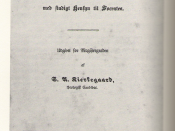This essay is a discussion of my objections and my reasons for my objections against the diversity and dependency thesis of moral relativism, which are outlined below.
Let me begin with a definition of 'moral relativism'. It is the acceptance that there are no standards of what is right or wrong that apply to all people at all times in history (The University of Notre Dame). For example, the ability for one cultural group to pass judgment on any situation, when the same situation would be treated differently by another cultural group. Thus showing that different cultural groups of people have different perspectives on what is morally right or wrong.
Pojman (2006) found that moral relativism has two main arguments:1.Diversity Thesis - What is considered morally right and wrong varies from society to society, so there are no moral principles accepted by all societies. (Cultural Relativism)2. Dependency Thesis - All moral principles derive their validity from cultural acceptance.
These two reasons combined, make a third and final point of moral relativism, its definition:3.Moral relativism - Therefore there are no universally valid moral principles, objective standards which apply to all people everywhere at all times.
It is said that the diversity thesis and the dependency thesis are good reasons, and therefore, we should believe in moral relativism.
Pojman (2004) argued that cultural relativism (the diversity thesis) does not entail moral relativism. There is great cultural diversity within the world, and most societies have their own fundamental moral principles. When cultural diversity is looked at as a singular notion, it is then obvious that there is and always has been cultural diversity, and thus it is neutral between many theories. Without cultural relativism, moral relativism only has a half meaning. To reject cultural relativism altogether, is to admit...


